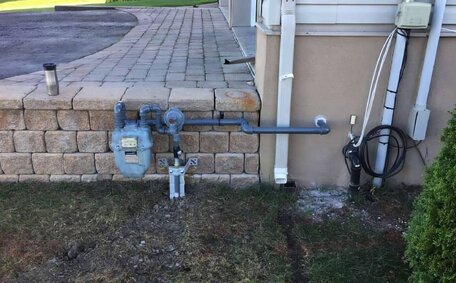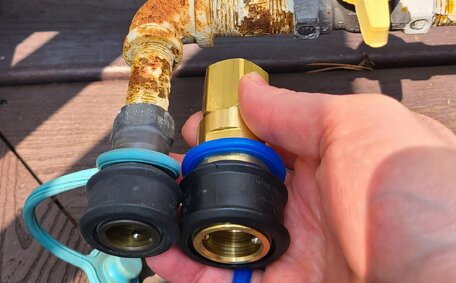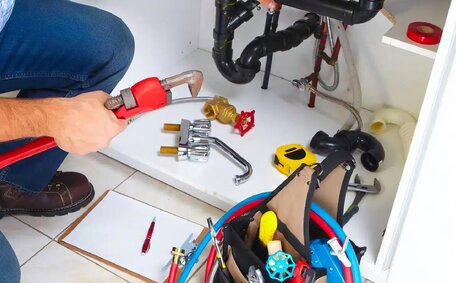How Water Quality Impacts Plumbing Systems
Contaminants in water can corrode pipes, clog fixtures and foster bacteria growth, leading to plumbing problems and increased risk of leaks or bursts.
Hard water, high in minerals, leaves deposits that compromise water flow and quality. Chlorine, iron and sediment can gradually damage your pipes.
pH imbalances also cause pipe erosion. Although gradual, the impact of poor tap water quality is detrimental; a plumber can identify solutions for these issues.
Seek a licensed plumber to assess your tap water and install filters or softeners if needed. Regular maintenance helps prevent issues and extends your system’s lifespan.
Regular maintenance detects early issues and ensures optimal water flow. Clean fixtures and aerators regularly, and for blockages, promptly contact a local plumber.
Key Water Contaminants and Their Effects on Plumbing
Some of the most concerning water contaminants in your area include:
- Chlorine - Added during water treatment for disinfection, chlorine can be corrosive to metal pipes and fittings over time. The disinfection byproducts formed when chlorine reacts with organic matter may also present significant health risks.
- Sediment - Particles like sand, silt, and clay can accumulate in pipes and water heaters, reducing flow.
- Minerals - Hard water containing high calcium and magnesium levels, which can exacerbate a leak in your plumbing, contributes to mineral deposits and scale buildup.
- Iron - Iron particles often enter groundwater supplies and can discolour plumbing fixtures and laundry.
Let us at Proximity Plumbing be your experts in installing water softeners and filtration systems, customising to your home’s unique water chemistry needs. Let us help identify problem areas and offer flushing services to remove problematic sediment accumulation. Ensuring quality water flows in your home is a task for your plumber; your fixtures and appliances depend on it to operate efficiently and maintain good working order.
When you’re looking for a Sydney emergency plumber, don’t hesitate to call one promptly, especially if contaminated water is a factor in pipe corrosion, restrictions, and leaks. Your local Sydney emergency plumber who is always ready and we can help with a rapid response to diagnose and rectify any plumbing disasters. Our team is adept at handling complex plumbing emergencies efficiently, ensuring no delay in stabilising your home’s water and plumbing stability.
Pipe Materials and Their Reaction to Water Quality Issues
The pipe materials in your home affect interaction with water contaminants. Consult with your plumber to select materials that ensure longevity and prevent corrosion.
Metal pipes like copper and galvanised steel are vulnerable to corrosion over time when exposed to acidic water or high mineral content. The resulting pinhole leaks can introduce damage into your infrastructure and lead to major plumbing issues, water damage, and mould growth if not addressed promptly.
PVC pipes resist chemical corrosion but can accrue scale, impacting your hot water system. Sediment buildup in water heaters over time can impede both hot and cold water flow.
CPVC plastic withstands higher temperatures, making it useful for hot water lines. But chlorinated compounds in treated water can still degrade CPVC over decades of exposure.
Cross-linked polyethylene (PEX) is highly chemical-resistant and can last 25-30 years under normal conditions before needing replacement.
No single material is impervious to how water quality issues can impact the plumbing system. Proper installation and maintaining plumbing services with adequate water treatment is key. Marsfield Plumbing, where we can help advise on the best options for your house and install filtration to optimise water conditions.
The resulting pinhole leaks and restrictions can lead to major wardness Affects Plumbing and Fixtures
Household plumbing is affected by water hardness, which refers to the concentration of calcium and magnesium minerals present in water. In areas like Marsfield with hard water, high mineral content can lead to limescale buildup in plumbing systems and fixturer flow, reduces pipe capacity, and necessitates frequent repairs.
Hard water also leaves behind mineral deposits on showerheads, faucets, and appliances like dishwashers. The scale clogs small openings, jets, and valves, hindering performance. Poor rinsing, spotting, and slowed drainage are common signs your plumber can address.
Marsfield Plumbing can test your water to measure hardness and suggest water softeners and regular servicing to manage mineral content and scale.
Installing a water softener offers effective control of water hardness. Contact Marsfield Plumbing for professional guidance on water treatment options.
The Effects of pH Levels on Pipes and Plumbing
The pH level of water can have a significant impact on plumbing systems. Water that is too acidic or basic can corrode pipes and cause damage over time.
Acidic water with a low pH below 6.5 can corrode metal pipes like copper and iron. The acidic water aggressively erodes the metal to the point of creating leaks and potentially complete water system failures. Plastic pipes like PVC and CPVC are more resistant but can become brittle and crack under very low pH conditions.
On the other end of the spectrum, alkaline water with a high pH over 8.5 is also problematic. The basic water leaches minerals like calcium and magnesium out of metal pipes, forming scale buildup within your hot water system. This accumulation narrows pipe diameter, impacts hot water systems, lowers water pressure, and necessitates frequent repairs.
Balanced water with a neutral pH around 7 is ideal to avoid conditions that may damage your plumbing system’s health and longevity. Marsfield Plumbing can help identify optimal pH balance by testing your home’s water. If needed, we can install acid neutralising filters or alkaline water ionisers to optimise your water chemistry.
Monitoring both pH and mineral content offers a complete view of water quality, enabling tailored solutions against corrosion and scale. Contact Marsfield Plumbing for safe, efficient plumbing maintenance.
The Role of Water Pressure in Causing Plumbing Emergencies
Fluctuating water pressure can be a catalyst for plumbing emergencies. High water pressure stresses pipes and fittings, while low pressure allows contaminants to enter the system.
Turning off water when pressure exceeds 550 kPa helps prevent damage to supply lines and potential leaks or bursts. Excess pressure can wear away pipe interiors and fail valves and tubes.
Low water pressure under 140 kPa risks introducing pollutants through cracks and fittings, allowing backflow and groundwater infiltration, and impeding sediment flush out.
Marsfield Plumbing can assist with emergency repairs, assessing your home’s static and flowing water pressure using professional gauges. Should call for our specialist help If a gas leak or other issue affects your pressure, we can install regulating valves and booster pumps calibrated for your property’s optimal pressure. Proactive monitoring and control of your plumbing systems water pressure helps avoid catastrophic failures.
Contact Marsfield Plumbing for irregular pressure or help optimising your system. Preventative maintenance identifies risks before major incidents. Our experts can ensure your system maintains safe, reliable water pressure.
Extremes in water temperature stress plumbing materials and hasten wear and tear.
At temperatures above 60°C, heat can damage plastic pipes such as PEX, potentially causing bursts at joints and bends. Freezing can cause cracks, allowing contaminant entry.
Fluctuations between hot and cold extremes also set up thermal expansion and contraProper insulation of pipes protects against frost and overheating, preventing costly repairs.
Addressing these concerns with your water supply as soon as possible will avert major incidents and ensure the longevity of your plumbing infrastructure.
Signs of Developing Water Quality Issues in Plumbing
Clogged Drains and Bad Odours
Foul odours are also indicative of bacteria or mould buildup. Slow drainage can result in stagnant water that allows contaminants to linger.
Visible Pipe Corrosion and Rust
Pipes showing rust or pinhole leaks suggest acidic water is corroding metal; blue-green deposits can indicate copper corrosion.
Discoloured or Smelly Water
Cloudy or discoloured water with particles suggests high sediment or iron; a bad odour or taste may indicate organic contamination, rendering water unsafe.
Failing Water Appliances
Scale buildup inside water heaters and on your taps specifically reduces efficiency and lifespan. Mineral deposits on fixtures lead to spotting and poor performance.
Low Water Pressure
Inadequate water pressure makes it hard to operate multiple fixtures at once and allows contaminant infiltration. Clogged pipes or failing well pumps may be the issue.
Plumbing Leaks
Leaks at joints suggest deteriorating pipes and seals, risking burst pipes. Large, rapid leaks signify catastrophic failure often from water chemistry issues.
Preventive Measures for Optimizing Water Quality
There are several key steps homeowners can take to optimise their water quality and avoid plumbing emergencies:
- Install water filters - Reverse osmosis or carbon filters eliminate harmful plumbing contaminants such as sediment and chlorine.
- Use water softeners - Water softeners reduce mineral content and prevent scale buildup that can restrict pipes and fixtures.
- Conduct drain cleaning - Regularly flushing your pipes prevents sediment buildup, ensuring unobstructed water flow and highlighting areas needing repair.
- Upgrade old plumbing - Replacing outdated pipes and fixtures with modern, corrosion-resistant materials prevents leaks and damage.
- Inspect for leaks - Regularly checking pipes, joints, valves and appliances for any small leaks allows for quick repairs.
- Maintain water pressure - Installing pressure regulators and deciding when to call plumber experts provide ideal solutions for your home, overseeing the installation and maintenance to keep your water in top quality.
Regular plumbing maintenance is key to avoiding catastrophic failures. Get in touch with us at Marsfield Plumbing to secure the safe, long-term operation of your system.
Responding to Water Quality Emergencies
When a water quality issue causes a plumbing emergency in your home or business, Immediate action is crucial in your plumbing emergency to prevent further damage. Turn off your water meter immediately if you notice contaminated water or a pipe failure to isolate the issue.
Check for flooding and Use towels to soak up water, slip on your gloves boots, and call an emergency plumber to address any plumbing issues promptly. Equip yourself with rubber gloves boots to stay protected from contact with unsanitary water.
Call your emergency plumber at Marsfield Plumbing right away for urgent assistance. As an emergency strikes outside normal business hours, Our emergency plumbers are always on call to respond, keeping your water safe after hours. Our Sydney emergency plumber will arrive swiftly, assess the hazards, and secure clean safe water by taking steps to stabilise your plumbing system.
Where faulty pipes or failures have allowed polluted water to enter, we will purge the system and shock-dose disinfectants to cleanse contamination. Filters, softeners, or other solutions may be prescribed to improve water quality going forward. We can also detect points of infiltration and seal them.
Be prepared for a plumbing emergency, which can happen without warning. At Marsfield Plumbing, we promptly ensure your safety and water quality with rapid containment and remediation.
We understand the stress of emergency plumbing situations and work diligently to restore clean, reliable water service. Call emergency support at Marsfield Plumbing immediately anytime water quality jeopardises your home or business.






